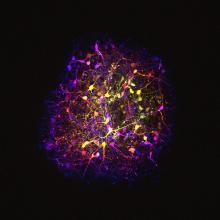
International Master In Neurodegenerative Diseases - iMIND
Understanding our brain, its functioning and its disorders, represents one of the great scientific challenges of the 21st century. This is highlighted by the significant global burden posed by diseases affecting the nervous system, as neurological and psychiatric disorders account for more than a third of the total disease cost in Europe. Specifically, the study of neurodegenerative diseases as been identified by many countries as a priority for developing patient support systems, healthcare, and research.
The International Master in Neurodegenerative Diseases (iMIND) is a multidisciplinary program built on a partnership between Sorbonne Université (Paris) and the Paris Brain Institute.
It aims to train students who wish to understand the brain function in normal and pathological conditions, by:
- providing access to the latest knowledge on neurodegenerative diseases, in close proximity with the research community (scientific teams, senior and junior researchers, technical platforms, living labs…).
- opening students up to an international scientific environment, through exchanges for courses and internships in partner universities, specifically Heidelberg University; opportunities to attend conferences from international researchers at the Paris Brain Institute; and interacting with students from different nationalities.
The main path to integrate iMIND is through application for the second year of Master (M2). However, it is possible for students enrolled in the first year of the Master of Neuroscience to join during the second semester, in the context of a semester exchange with the Master of Molecular Biosciences, major Neuroscience, of Heidelberg University.
.
The iMIND Master 2 combines coursework specialized in the study of the brain function and dysfunctions, with a focus on neurodegenerative diseases (M2 year, 3rd semester), and a master’s thesis (M2 year, 4th semester).
Objectives
By the end of the program, students will have gained:
• A deeper knowledge on the cellular and molecular mechanisms underlying brain function and dysfunction.
• A comprehensive understanding of the latest approaches used to study brain diseases, including omics, stem cell research and organoids, calcium imaging and optogenetics.
• Insights into the development of novel treatments and solutions, translating fundamental research into practical ways to manage brain disorders.
• Transferable skills, including the ability to critically read and analyze scientific literature, design experiments and interpret results, as well as proficiency in scientific writing and presentation.

Please note that this program is in English.
The Paris Brain Institute offers upon selection up to 5 scholarships for international students (1200€/month during the 1st semester).
To join iMIND in M1: candidates are encouraged to apply to the first year of the Neurosciences master. A call for applications is then launched in September among M1 students for the exchange with the University of Heidelberg.
To join iMIND in M2: select iMIND on the application site https://sciences.sorbonne-universite.fr/en/apply/master
Since iMIND is a limited enrollment track, candidates are encouraged to also apply to other tracks within the Neurosciences Master.
Applicants must indicate, in their personal statement, for which tracks they wish to be considered and the order of preference.
For more information, please contact:
iMIND Director Dr Hélène Cheval Helene.cheval@sorbonne-universite.fr
Master 2
M2S3 (30 ECTS)
Main iMIND-specific courses (24 ECTS)
- MU5BIN01 – Developing your masters research project (6 ECTS)
- MU5BIN07 - Glial pathologies and neurodegenerative diseases (6 ECTS)
- MU5BIN18 - Novel technologies applied to human neuropathologies (6 ECTS)
- MU5BIN22 - Hot topics: transdisciplinary approaches to neurodegenerative and psychiatric diseases (6 ECTS)
Specialization coursework (6 ECTS)
OR
- 1 module from each specialized short course MU5BIN16 and MU5BIN17 (2 x 3 ECTS)
OR
- 1 module from one of the specialized short courses (MU5BIN16 or MU5BIN17) and UE21PIXX14 "Neurodegenerative diseases and abnormal movements 1: clinical and therapeutic aspects" from EPHE (2 x 3 ECTS)
Modules from MU5BIN16 and MU5BIN17 to choose from:
- MU5BIN16 - Hippocampus : from cells to physiology and human pathology (3 ECTS)
- MU5BIN17 - New Methods for Behavioral & Cognitive Explorations (3 ECTS)
- MU5BIN17 - Neuro-Glia Interactions (3 ECTS)
- MU5BIN17 - Neuropsychiatric Genetics (3 ECTS)
- MU5BIN17 - Cerebellum : From Cells and Circuits to Motor and Cognitive Behaviors (3 ECTS)
This core program can be modified depending on the student's specific educational goals and may include other courses from the Neuroscience M2.
M2S4: Master’s thesis (30 ECTS)
The master’s thesis is a 5 to 6 months internship that can be done in France or abroad.
Annual summer schools are co-organized as an extended collaboration between iMIND and the master of Molecular Biosciences, major Neurosciences, from Heidelberg University.
These one-week events aim to create a strong collaborative network, enabling master students, PhD students and post-doctoral researchers to be exposed to the most recent and exciting approaches in the fields of neuroscience, while at the same time facilitating meetings between students and researchers from our respective universities.
Up to 5 spots are reserved for iMIND master students.
Organization:
Each morning, two researchers—one from Sorbonne University and one from Heidelberg University—present their research on brain pathologies. Afterward, participants engage in a poster session and brainstorming activity where they work in groups to develop research projects using the methods discussed. These sessions, overseen by the speakers, foster critical thinking and discussion. The day concludes with group presentations, focusing on research proposals for funding or postdoctoral applications. Additionally, sessions on soft skills and the societal impact of research are included.
The first edition took place at the oceanography observatory in Banyuls-Sur-Mer from the 28th of July to the 2nd of August 2024, and involved eight researchers working in institutes affiliated to Sorbonne University (Paris Brain Institute, Institut du Cerveau, ICM) or Heidelberg University (Interdisciplinary Center for Neuroscience, IZN).
Next summer school will take place in the castle of Ebernburg, Germany, from the 6th to the 12th of July 2025 !
Contact
iMIND Director
Dr Hélène Cheval
Administration office
Véronique de Surirey
Clément Perrot (iMIND 2020-2021)I followed the iMIND course primarily because of my interest in neurodegenerative diseases and its international dimension. I remember above all the teachers who were very committed to their respective courses, as well as the quality of the teaching. The iMIND program really gave me a great theoretical knowledge of the different brain diseases since in each subject, several diseases are tackled with always a different practical approach showing the richness of the possible studies. Moreover, some courses are very enriching to continue with a thesis, such as the course: "HOT TOPICS" where you create a research project with the help of a tutor, which is then evaluated by professors and researchers, always in a very benevolent way. I would add that the teaching does not focus solely on theoretical aspects of neurodegenerative diseases. Indeed, the practical aspect of the various neuroscience techniques is widely emphasised, with a "NOVEL TECHNOLOGIES" course that explains in detail each branch of neuroscience techniques, starting with imaging and ending with electrophysiology.
To finish, I would like to mention the human aspect of this master, a very important point. Because of the small number of students, the educational team is very available for each of us, they answer each of our questions and try to find the best possible arrangement, even in the most difficult conditions, such as during the lockdown period that took place during my year of the master. Finally, the team spirit is very present in this master: group work is proposed, exchanges of courses are organised between the students, making the atmosphere very pleasant.
Aurélien Caron (iMIND 2020-2021)To me, the iMIND program was a rich experience. I was able to obtain a great amount of knowledge on topics that were rather new to me, taught by specialized researchers. The Pasteur course was a great opportunity to get high-level theoretical and practical courses in small groups. The Hot Topics seminars allowed me to learn more on fields unknown to me, and coming up with a research project layout was a nice initiation before starting my Ph.D., as well as another opportunity to gain maturity and show creativity and initiative. The courses being taught in English is a pro, considering the English-speaking context of Research. I advise taking the iMIND program, a great opportunity to finish one's Master's degree with ambitious courses that differ from what is offered in more traditional programs.
Amin Benadjal (iMIND 2019-2020)The iMIND course has been truly amazing! I have deepened my knowledge of neurodegenerative diseases while learning about the theoretical aspect of new cutting-edge techniques. The small size of the class allows for more interaction with the teacher-researchers and more active learning. The supervision is great and the course has totally prepared me for my M2 internship and for my PhD! It was the year I learned the most at university and the year that served me the most! I recommend it 100%!
Elisa Popa (IMIND 2023-2024)“Passionate about neuroscience and health, it quickly became clear to me that I wanted to follow this programme. Today, I find it extremely instructive. First of all, 'Brain to Market' was an enriching experience because of the challenge of combining neuroscience and entrepreneurship for novices. I particularly appreciated the diversity of profiles (business scientists, engineers, designers and researchers) who worked together to come up with innovative concepts.
'Novel Technologies' was also very interesting, as it presented cutting-edge technologies used in the main areas of neuroscience, with the participation of experts with whom it was easy to exchange ideas. What's more, the practical workshops in the ICM provided a better understanding of these technologies and their current use. Similarly, 'Glial Pathologies' provided an opportunity to review the basics of the main neurodegenerative pathologies through animated lectures. Each disease is approached from different angles: functional, translational and clinical ; making it a comprehensive and essential part of the course.
Finally, 'Hot Topics' is the most demanding teaching unit on this programme, but it's also the one I enjoyed the most. The aim is, working alongside a tutor, to develop a project aimed at answering an as yet unknown biological question. This requires a real commitment on the part of the student, but it's also what makes this subject so rewarding when it's presented to a committee of experts.
To sum up, I would say that the iMIND programme is comprehensive, instructive and encourages collaboration. What's more, the fact that it takes place at the ICM gives you a real insight into what research is all about.”
